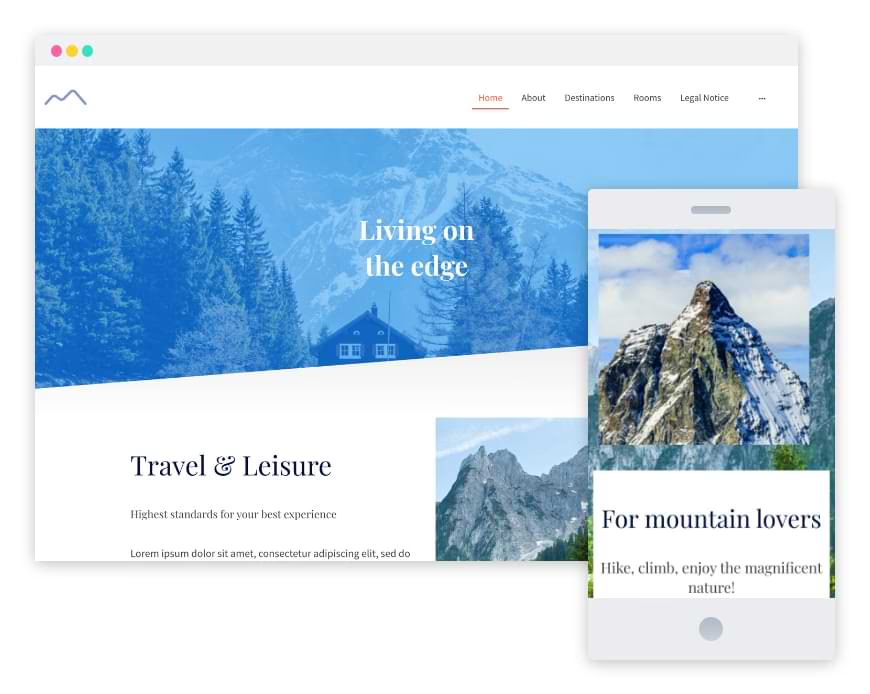Small business website builder
Customizable templates for SMEs and the self-employed
Industry-specific designs, content, and image library
Free domain, SSL, and email

Why should independent businesses need a website?
What information belongs on a small business website?
To get the most out of your small business website, there's certain information you need to include. Your site doesn’t have to be complicated with a lot of content to be successful — just listing your company's contact info is a great way to start. Here's a few things that every SME website should include:
Contact info, business location (preferably with a map), plus a written description of how to get there
Your mission and a little bit about what you and your team do
Photos, logos or other images that can help people remember your company
Links to your social media channels
Reviews and comments from existing customers

Engaging templates optimized for business
Everything you need for your online presence
Professional email
Domain and SSL
Responsive design
Easy analytics
Built-in privacy tools
Grows with you
Choose how you want to build your website
From idea to website in record time with our AI Website Builder
Intuitive website editing with simple design options
Free domain for 1 year 0
Professional email address with 2 GB inbox 0
Includes 10 GB webspace & 10 pages
From idea to website in record time with our AI Website Builder
Intuitive website editing with advanced design options 0
Free domain for 1 year 0
Professional email address with 12 GB inbox 0
Includes 50 GB webspace & 200 pages
SiteAnalytics 0
Integrated online booking tool 0
AI Text Generator & AI Text Improver 0
Professional design with AI Image Generator & AI Color Palette Generator 0
AI SEO Text Generator 0
From idea to website in record time with our AI Website Builder
Intuitive website editing with advanced design options 0
Free domain for 1 year 0
Professional email address with active sync on all devices and 50 GB inbox 0
Unlimited webspace & pages
SiteAnalytics Plus 0
Integrated online booking tool 0
AI Text Generator & AI Text Improver 0
Professional design with AI Image Generator & AI Color Palette Generator 0
AI SEO Text Generator 0
SEO-optimization with rankingCoach Standard
State and local taxes will apply. Click here for our General Terms and Conditions.

Websites for SMEs
Attracting visitors to your small business website should be one of your first goals. An easy way to get started is to fill out the company profile on your website. It contains important data such as your company’s address and email address. This not only keeps your customers up to date, but it's also really important for search engines. Keeping your contact info updated and consistent on your website can help improve your rankings.
If you want to improve your reach even further, list your businesses in popular directories with [local business listings]( "local business listings"). You can verify your company profile on Google Maps, Yelp, or other directories. This way you'll be found both online and off.
Attracting visitors to your small business website should be one of your first goals. An easy way to get started is to fill out the company profile on your website. It contains important data such as your company’s address and email address. This not only keeps your customers up to date, but it's also really important for search engines. Keeping your contact info updated and consistent on your website can help improve your rankings.
If you want to improve your reach even further, list your businesses in popular directories with [local business listings]( "local business listings"). You can verify your company profile on Google Maps, Yelp, or other directories. This way you'll be found both online and off.
You can create a website for your small and medium business in just a few steps — even if you don’t have any knowledge of programming languages like HTML or CSS. First, choose the right plan and create an account with IONOS. After you pick a custom domain, you can choose a website template. Then all you have to do is fill it with great content! The IONOS website builder makes it all simple and intuitive.
You can also be creative and design the website yourself with our small business website builder. Search engine optimization (SEO) is definitely something you should think about, especially if you want more people to find your site. In Search Engine Optimization from A to Z, you'll find some great explanations for the most common SEO terms.
You can create a website for your small and medium business in just a few steps — even if you don’t have any knowledge of programming languages like HTML or CSS. First, choose the right plan and create an account with IONOS. After you pick a custom domain, you can choose a website template. Then all you have to do is fill it with great content! The IONOS website builder makes it all simple and intuitive.
You can also be creative and design the website yourself with our small business website builder. Search engine optimization (SEO) is definitely something you should think about, especially if you want more people to find your site. In Search Engine Optimization from A to Z, you'll find some great explanations for the most common SEO terms.
All IONOS websites include an SSL certificate. By encrypting any information visitors transfer to your site, an SSL certificate reliably protects your visitor's data. However, there are also other rules your small business website has to follow. A few US states have enacted data protection legislation. We recommend checking if any of these apply to you.
Companies that do business in California need to follow the California Consumer Privacy Act. This legislation gives people residing in the state control over how their personal data is used. Because of California's size, this act is likely to set the national standard for data protection.
In Virginia, the Consumer Data Protection Act (CDPA) is set to take effect on January 1, 2023. After that date, the CDPA will be the second consumer data privacy law in the United States.
Two states — Washington and New York — both have bills currently under debate. If passed, the Washington Privacy Act (WPA) and the New York Privacy Act (NYPA) could soon come into force.
Don’t live in CA, VA, WA or NY? Try any one of these privacy measures to make your website more transparent:
Privacy policy: There is no US federal law that requires a privacy policy. But if you collect personal information from users, it makes sense to include a privacy policy on your site that explains how you handle visitor's data.
Links to social media: When linking to social media platforms, make sure that your visitors can decide for themselves whether they want their data transferred.
Comment section: If your small business website allows visitors to leave comments, you should let them know that you are saving their data.
Although the GDPR is a European Union (EU) initiative, if your website handles any data from visitors who live there, then your website has to comply with the EU's GDPR.
All IONOS websites include an SSL certificate. By encrypting any information visitors transfer to your site, an SSL certificate reliably protects your visitor's data. However, there are also other rules your small business website has to follow. A few US states have enacted data protection legislation. We recommend checking if any of these apply to you.
Companies that do business in California need to follow the California Consumer Privacy Act. This legislation gives people residing in the state control over how their personal data is used. Because of California's size, this act is likely to set the national standard for data protection.
In Virginia, the Consumer Data Protection Act (CDPA) is set to take effect on January 1, 2023. After that date, the CDPA will be the second consumer data privacy law in the United States.
Two states — Washington and New York — both have bills currently under debate. If passed, the Washington Privacy Act (WPA) and the New York Privacy Act (NYPA) could soon come into force.
Don’t live in CA, VA, WA or NY? Try any one of these privacy measures to make your website more transparent:
Privacy policy: There is no US federal law that requires a privacy policy. But if you collect personal information from users, it makes sense to include a privacy policy on your site that explains how you handle visitor's data.
Links to social media: When linking to social media platforms, make sure that your visitors can decide for themselves whether they want their data transferred.
Comment section: If your small business website allows visitors to leave comments, you should let them know that you are saving their data.
Although the GDPR is a European Union (EU) initiative, if your website handles any data from visitors who live there, then your website has to comply with the EU's GDPR.




